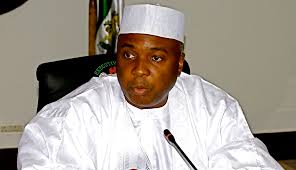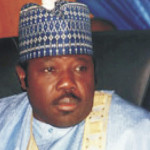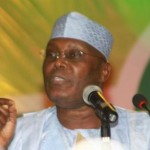The NASS Leadership Crisis
Articles/Opinion, Latest Headlines Sunday, June 14th, 2015
By Adewale Kupoluyi – The legislative palace coup that took place in the National Assembly a few days ago, which led to the election of its leadership would remain controversial in the nation’s political landscape. We recall that while some All Progressive Congress (APC) senators were waiting to meet with President Muhammadu Buhari at the International Conference Centre (ICC), Abuja, to resolve the contending issues over the election of NASS leadership, Senator Bukola Saraki was quickly elected as the President of Senate, mostly by senators elected on the platform of the opposition People’s Democratic Party (PDP). The proposed meeting with President Buhari was meant to take a decisive stance on the earlier position of the APC to elect its preferred candidates, Senator Ahmed Lawan for the Senate presidency and Hon. Femi Gbajabiamila as Speaker of the House of Representatives.
The elections, which were conducted at variance with the party’s instruction, saw Senator Saraki (APC, Kwara Central) being sworn-in as President of the 8th Senate, while Ike Ekweremadu (PDP, Enugu West) was sworn-in as Deputy Senate President by the Clerk of the National Assembly, Mr. Salisu Maikasuwa. Saraki was elected unopposed by 57 out of the 108 senators-elect. Ekweremadu, on his part, polled 54 votes to beat Senator Ali Ndume (APC, Borno South), who scored 20 votes, while one vote was declared invalid. In all, fifty-one senators, including Senator Lawan (APC, Yobe North), were absent when Saraki was elected. George Akume, who was the party’s preferred candidate for the position of Deputy Senate President, also lost out to PDP’s Senator Ike Ekwerenmadu.
Initially, the APC rejected the elections of Saraki as Senate President as well as that of Hon. Yakubu Dogora, who emerged as the Speaker, House of Representatives and vowed to punish its members that were involved in what could be described as a grand conspiracy and inordinate ambition to undermine the party’s desire to pick candidates of its choice for the National Assembly topmost positions. The APC vowed that those that worked against the interest of the party risked being suspended or given outright expulsion for disregarding the directive not to stand for the elections in line with Article 9.1 Sub-Section 2 of its constitution. The APC later changed its mind that it had accepted the outcome of the elections.
Though unfortunate, the development is an abysmal failure on the part of the APC to meet the very basic requirements of a strong party with unity of thought, action, discipline and unity. This is shown by the fact that the succession crisis was engineered purely by greed and ambition of affected lawmakers, who refused to submit to the decision of the party on whose platform they were elected in the first instance. What has just played-out is nothing but a betrayal of trust and disrespect to the tenets of party supremacy. Many people are certainly not comfortable with the failure of the APC leadership to exercise full control over his party’s caucus in executing its decisions. It is a pity that Saraki and Dogara, propelled by over-ambition, decided to violate party’s directives. Following the unfolding drama, there seems to be two dimensions to the way and manner of how the leadership of the National Assembly emerged.
While some feel that the election of Saraki as Senate President and Dogara as Speaker of the House of Representatives, was a welcome development, others view the circumstance in which they emerged as a brazen insult and assault on our polity. Those in first position argue that though the action may not be politically right, but it is parliamentary and legally okay hinging their argument on Section 50 of the 1999 Nigerian Constitution (as amended), which states that the process of electing leaders of the National Assembly should be carried out inside the two chambers among the members themselves without an outside interference. This second group believes that a quorum was not formed before the election (or selection) and therefore, there was no valid election. This group further contends that at least 75 senators ought to have participated in the process instead of the 57 that actually took part in it. For me, the elections smack short of morality and credibility. Already, members of Senate Unity Forum (SUF), a group of Senators in the APC, who were in support of the failed bid of Senator Lawan to become the Senate President, have vowed to go to seek legal redress.
A similar parliamentary coup took place in 2011, before the inauguration of the 7th National Assembly, when the ruling PDP, which then had the majority in the two chambers had concluded arrangements to zone the leadership positions. For the Upper Chamber, the senators had already planned to maintain the party’s status quo but the scenario was different in the Lower Chamber as the party leadership had zoned the speakership to the South-West with the South-South, North-West and North-Central occupying the first, second and third positions, respectively. At the end, the game-plan changed as the opposition members in the House alongside some PDP lawmakers upturned the PDP zoning arrangement. Hon. Aminu Tambuwal, then Sokoto-PDP, emerged the Speaker against the PDP’s chosen candidate from the South-West, Hon. Mulikat Akande-Adeola.
As we await to see how events unfold, the way and manner that APC handles this issue would determine the fate of the party under the current dispensation. While the members of the legislature should be encouraged and allowed to choose its leaders, the position of the political parties of the members that constitute the legislature should also not be shoved aside. This would help to manage avoidable frictions that could ensure when there are challenges in carrying out legislative duties. The ruling party should learn from the mistakes of the PDP, which led to its eventual disintegration and defeat in the last general elections because the PDP behaved like an umpire that could do it all alone by boasting to even rule for 60 years. The APC, though still controls a majority of members in the National Assembly, should always remember that it cannot always have its way at all times. There is the need to carry along other political parties’ interests in the course of carrying out its constitutional duties. Robust politicking is about fair negotiation, consensus building and compromises. That is why the 57 senators that elected Saraki should have waited for the outcome of the scheduled meeting with President Buhari before the election.
Now that the deed has been done, APC should immediately embark on damage control to douse the tension generated by the controversial elections of the Senate President and Reps’ Speaker. It is too early in the current dispensation for the APC to be enmeshed in this kind of crisis that is capable of causing cracks and dislocation that could eventually prevent it from delivering good governance. The people the party chooses as leaders all the arms of government would largely determine its success or otherwise. That is why we should ensure that those that have emerged truly serve the Nigerian people. The APC should avoid being seen as a disappointment by failing to deliver the desired change it promised during the electioneering. The leadership of APC should manage its success by eschewing unnecessary personal interest, speak with one voice and allow national interest to take pre-eminence in the conduct of the affairs of the party. The fall-out of a divided house would be too severe to imagine. This time around, the electorate deserve the best and the desired change should certainly begin from the 8th National Assembly.
Kupoluyi writes from Federal University of Agriculture, Abeokuta (FUNAAB), adewalekupoluyi@yahoo.co.uk, @AdewaleKupoluyi, adewalekupoluyi.blogspot.com
Related Posts
Short URL: https://www.africanexaminer.com/?p=24022






















